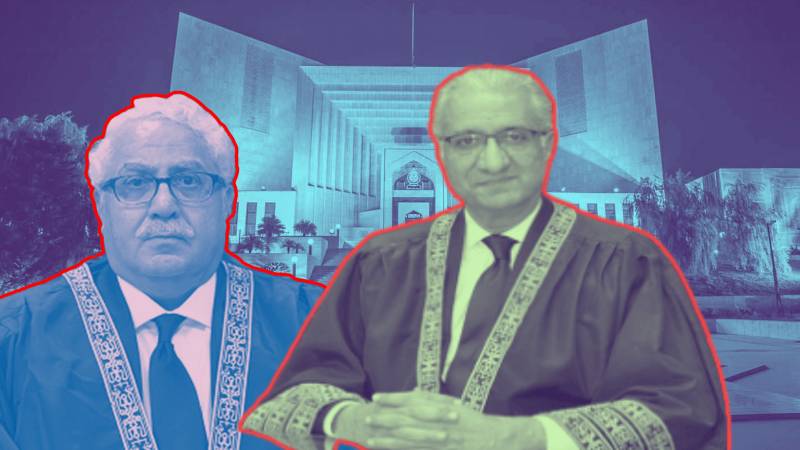
The top court on Monday declared as maintainable an appeal filed by the federal government, regarding proceedings in the Supreme Judicial Council (SJC) against retired judges.
The top court subsequently decided to appoint an amicus in the case. It directed the Attorney General of Pakistan (AGP) to furnish names of suitable legal experts and the legal questions requiring answers.
This was directed as a five-member bench, headed by Justice Aminud Din, heard the government's appeal.
During the hearing, the attorney general argued on the issue of time condonation. He contended that in 1989, the Supreme Court had declared an appeal regarding judges' appointment as maintainable even though the timeframe for filing an appeal had lapsed. He further told the bench that the President sends references against a judge following approval from the federal cabinet, adding that referring a presidential reference is not his discretion.
He further submitted that the President and the federal government were not listed as respondents in this case. Moreover, the attorney general maintained that an inquiry against a judge cannot be quashed on the grounds of retirement or resignation.
The attorney general further submitted that it was not an issue of pensions, rather a matter of public confidence in the judiciary and the transparency of the top court that necessitated action.
While declaring the government's appeal maintainable, the top court adjourned further hearings until February 19.
In its appeal, the federal government named the Supreme Court registrar and the Supreme Judicial Council (SJC) secretary as respondents and requested the court to set aside the verdict in the Afiya Shehrbano Zia case.
What is the Afiya Shehrbano Zia Case
Civil society activist Afiya Shehrbano Zia had filed a complaint in the SJC against former chief justice Mian Saqib Nisar over an alleged breach of the judges' code of conduct.
Justice (retired) Nisar, who was the chairman of the SJC at the time, oversaw as the complaint against him was shelved.
Later, Afia moved a constitutional petition in the Supreme Court requesting it to hold accountable those judges who have retired or resigned.
On June 27, 2023 — over four and a half years after Justice Nisar had retired — a two-judge bench comprising Justice Munib Akhtar (who authored the judgement) dismissed Zia's petition, maintaining that judges who have retired or resigned do not fall within the ambit of Article 209 and hence are not liable to face any action.
The federal government decided to file an ICA against this judgement in the aftermath of Justice Sayyed Mazahar Ali Akbar Naqvi's resignation from the top court. Justice Naqvi relinquished his post on January 10, just when the SJC was about to conclude its misconduct proceedings against him.
On January 13, during the last meeting of the SJC, the attorney general informed the council that the government would file an ICA against the verdict.
In its ICA, the government argued that the top court's June 27, 2023, verdict failed to distinguish between the consequences upon resignation of a judge under Article 206, retirement under Article 179 and removal under Article 209.
"The judgement has rendered the functionality of the SJC redundant by making Article 209 inapplicable to a judge who has retired or resigned while inquiry proceedings were pending against him and/or a show-cause notice has been issued to him," the government had argued.
The petition further said that it is a legal question whether the findings in the judgment undermine the principles of transparency, accountability and quality guaranteed under Articles 4, 10-A and 25 of the Constitution.
"Whether non-issuance of mandatory notice under Order XXVIIA of the Code of Civil Procedure, 1908 to the AGP and Advocate generals of the provinces renders the impugned judgment a nullity," the petitioner questioned.
The federal government urged the court to set aside the division bench's order and allow the SJC to carry on misconduct proceedings against judges who have resigned during proceedings.
Parochial interests or judicial accountability?
In response to the federal government's decision to file an intra-court appeal (ICA), petitioner Afiya Shehrbano Zia said she was committed to pursuing the case in good faith but not to serve the government's seemingly more parochial interests in leveraging the petition as punitive or coercive.
Other petitioners include Senator Afrasiab Khattak, Bushra Gohar, Senator Farhatullah Babar, Farida Shaheed, and Nighat Said Khan.
In a statement issued last week, the petitioner stated that the government might hold a special interest in pursuing the Naqvi reference for political ends, but their grievances and objectives pertain to larger issues of judicial accountability, independence, separation of state powers, and a justice system that serves civilian and democratic ends, not just state interests.
"For nearly five years, the reference and subsequent follow-up petition by conscientious citizens were ignored, neglected, sidelined, and unsupported by the entire legal community, with the notable exception of their counsel, Hina Jilani, and a few conscionable legal minds. Even large sections of the media, current affairs analysts, and commentators were unwilling to support or report on this cause. In this period, some respected petitioners have even passed away while waiting for an order," their statement read.
"The petitioners believe that accountability is important for judicial independence, but selectivity and singling out of certain judges by the state through its proxies, using references and proceedings against them, is an abuse of power and process, not a form of impartial and unbiased accountability. The petition must not be permitted to become a ruse for immunity or punitive action masqueraded as accountability," the statement said.

